… a great effect upon D’Artagnan, who recognised in her the lady of Meung, of Calais, and of Dover, whom his persecutor, the man with the scar, had saluted by the name of Milady.
Dumas
You come in the in door …
Travel is fatal to prejudice, bigotry, and narrow-mindedness, and many of our people need it sorely on these accounts. Broad, wholesome, charitable views of men and things cannot be acquired by vegetating in one little corner of the Earth all one’s lifetime.
Mark Twain
Tues 6th June 2017
Most of the buildings I saw as I walked around Calais were last century. Nothing of 17th century - probably blown away either by the local weather or by a world war. However, there’s always been fisherfolk living here. Surely there were well-established comfortable dwellings by the 17th century? It’s the shortest way to the UK and that’s where I was heading. By ship, just as Milady did. Here is a well-researched and fascinating account of Tudor Calais, the story of another Anne and grandeur past.

I don’t know enough about Calais to be a proper judge but I reckon it’s not regarded as a destination by many. Rather, a place of comings and goings, of moving on, of passing through. If one did have to stop, may I suggest the Hotel Richelieu? It proved to be a haven. I was tired from ten months of teaching English to Spanish children, and provided an inspiring encounter with a determined owner. He was a man with vision, a purpose, a direction. One by one, he was refurbishing each room by himself. Ladders were covered with drop cloths in a corner of the dining room. He was the waiter at breakfast. He was the concierge who welcomed me in the previous evening. He was nurse to his mother who lived in one of the rooms. He was very pleased and grateful about the future. He had a spectacular setting across the road from the Richelieu Gardens. There was every reason to be impressed with his endeavours.
Went out of the Hotel Richelieu early with ambition to walk to the port. A reconnoitre. I have to say the weather prevented any dawdling and I did not note any sculptures or monuments on my way through the damp park. It was blasting cold and wet and did not belong to my time of interest so I paid it no mind. If you ever go to Calais, you might find it all fascinating.
Walked for half an hour and realised I was not at the port. I’d gone the wrong way. Did get a sense of the weather. Wild! Gusty! Returning to pick up my bag, the lovely owner pointed me in the correct direction and off I went again, wet face, body bent against the wind and the weight of two backpacks. I’d left the big suitcase in storage in my favourite hostel in Barcelona to mark the beginning of my official research trip. I’d prepared an itinerary that took me through highlights of south England and Northern France, places I supposed Anne de Breuil had visited.
It was overwhelming approaching the port building. Massive fencing surrounded the place. It looked like a prison. I was a foot passenger. Once I’d been blown into the processing area, we were told the weather was to blame and we’d best wait until we were told we were going to be late. We watched the pounding water. Waited. Grim.
Again, I wondered about Anne’s travels through Calais. She’d certainly left France to eventually get involved in English court activities but no clear idea of where, how and when. After d’Artagnan first saw her at Meung she left to travel to London, possibly via Calais.
She’d arrived back in France to move into Place Vosages (Royal Place, number 6) before d’Artagnan saw her in church - that too could have been by way of Calais - and finally she’d arrived back to Boulogne after getting Buckingham assassinated. So, let’s assume Milady may have met Calais weather at some point!
Meanwhile, Milady, drunk with wrath, roaring from the deck of the vessel like a lioness being put aboard ship, had been tempted to throw herself into the sea in order to get back to the shore, for she could not accept the idea that she had been insulted by d’Artagnan, threatened by Athos, and was leaving France without being revenged on them.
Dumas
Finally, the winds abated, and the feet people were loaded before the cars and trucks. For a peaceful moment the ferry seemed rather restful. Then the truckies, families, and bikies stormed in to suck down beer and hamburgers in the clattering pub that is the public area of the ferry and smells and sounds were heaving. The decks were lined with smokers. The smoke stack billowed.
Finding it hard to settle, I walked round and around the accessible decks and the plush-carpeted areas with my pack on before realising I needed to charge my phone. Uh oh. I found an electrical socket next to a comfy chair! Uh oh again. Britain was not Europe and I had to buy an international adapter for the plug.
While watching the weather, the woman in the shop told me she’d seen it all before in her thirty-plus years on the boats, however, Des the purser had never seen anything like it. It was a category seven. Soon it was downgraded to a six. It’s all the colours of grey. Dark grey, puff smoke grey, seagull wing grey, demonic water wave grey, battleship grey and, inside its sticky carpet, enclosed, roast dinner, twinkly music, staff on tiptoes, and it’s called ‘Spirit of Britain’ and it’s late. Irony? Oh, I think so.
Watched a tug striving to enter the port. It looked like it was standing still, just bobbing up and down. Just to reiterate, we were still within port boundaries. The tug struggled against the tide. I wondered if we were going to need help getting out of port in this storm?
I saw the white cliffs of Dover for far too long as we were running so late we’d missed our parking spot. There was no berth for the Spirit of Britain for at least an hour. The cliffs looked broken and grubby from the sea. Sharp white boomerang birds with black tip wings sling through the air, hooking over the sharp waves. Sky cleared over England. Dark smudges all around us. More green now, less slate as it had been in France. White topped rollers. Pips and peaks. A seagull asleep on the water takes to his wings to escape us.
Calais used to be English.
Queen Mary of Scots said, ‘When I am dead and opened, you will find Philip and Calais lying in my heart’. (Is that where they got the idea of living a full life?)
July 2017
You will learn more about my English legs (stout) in future posts. For now, we return to France and pass through Calais once more.
When we arrived in Calais there was a press of foot passengers keen to get out of the door. It was a long deal, some problem with customs, but if you factored in plenty of time there’s no real problem. Some people were more pressed and needed urgently to reach appointments. Quietly reading The Times when a keen American bounded across the lounge room to tell me, ‘It’s time!’ But it wasn’t time at all. More waiting. Eventually I drifted back to my lonely banquette and waited some more until they opened the doors onto the staff-only bridge and we were allowed on to the bus to take us through the fortifications around the port. Perhaps here was room for P & O to improve their communications? Once at the terminal our promised bus to the centre of town did not materialise, and efforts had to be made to contact Tourist Information to discover the right way to get to Frethun.
Calais was decorated in all things British, which given I’d just left a heavily fortified England against all things French, or European, was slightly bizarre. There were actual, real, double-decker buses, and telephone boxes plonked at intersections. I looked at a stick-on picture of Big Ben pasted on a glass window. There was another of a black cab and a large Underground sign. Connecting Calais to Londres? Causing confusion for the locals? Or just tourists like me?
Eventually I found myself at Calais Frethun, a soulless train station kilometres from the town centre, putting off opening my packet of chips. I’ve already thrown down a baguette with a couple of slices of tomato and a lettuce leaf. I did stop at a gorgeous little restaurant by the bus stop on the way for a coffee and, not sure of my timing, I didn’t stay. I regretted that as I had an hour and a half to wait. And it was a superb coffee. Quel dommage.
I felt fenced in.
At times, while walking the Camino del Norte, I have remarked this before, I felt like a red blood cell in an artery running through the North of Spain. Us pilgrim cells brought cash and action to the route, like oxygen, if you’ve not caught up with the analogy, such as it is. Unless time and interest allows, most people do not deviate from their chosen route, like the purposeful hotelier. Most tourists follow ruts in the road and see only what is placed there to see. What wonders and mysteries do they miss? Could they travel more broadly? Here in the north of France, it is no longer possible to stray. One must go where the paths and fences lead.
And you leave by the out door …

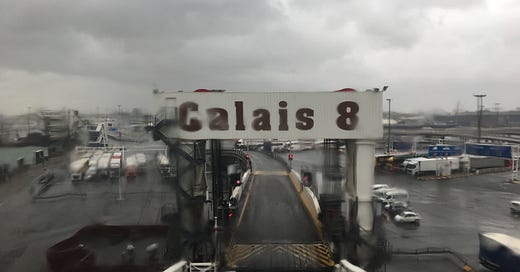



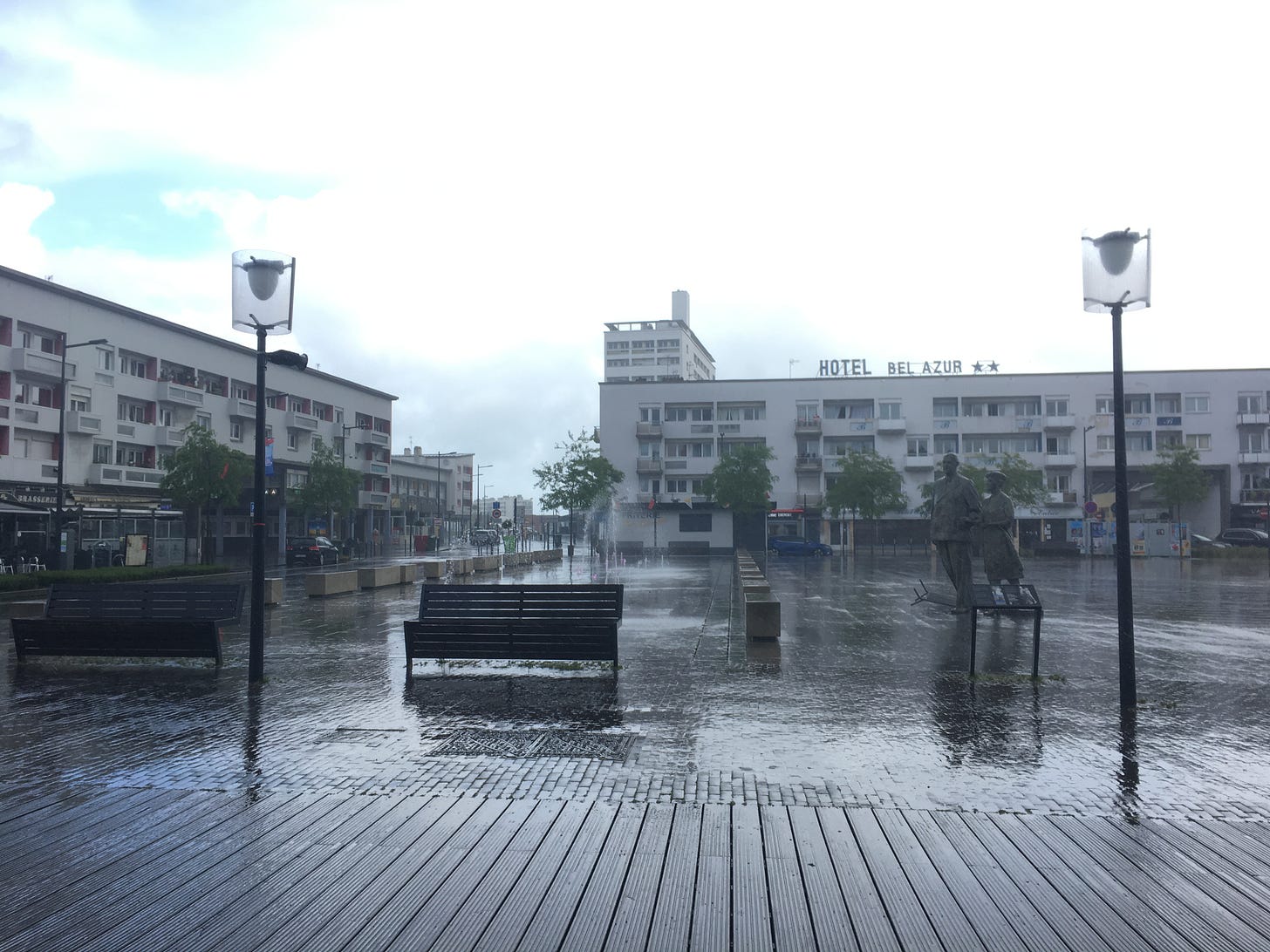



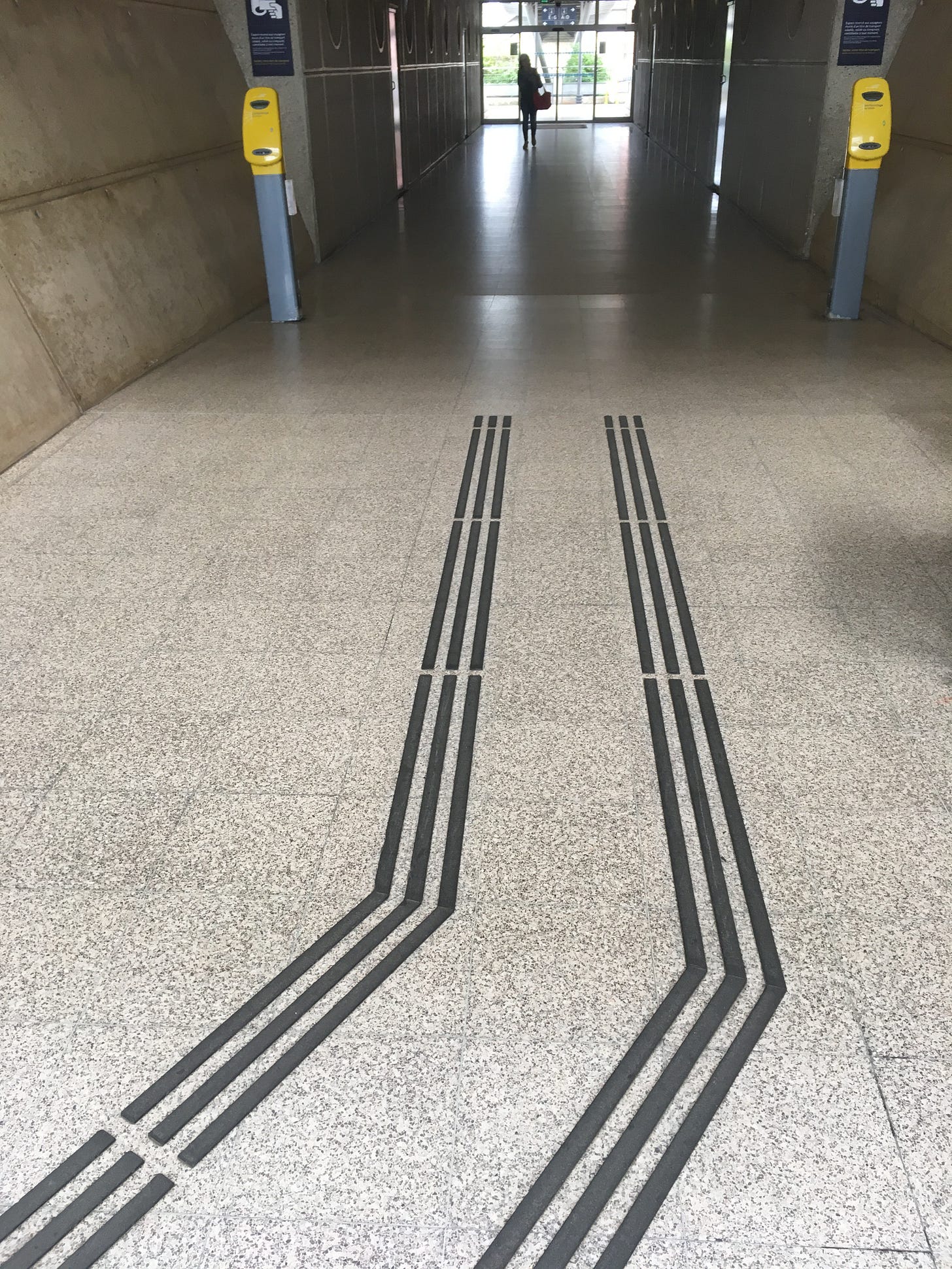
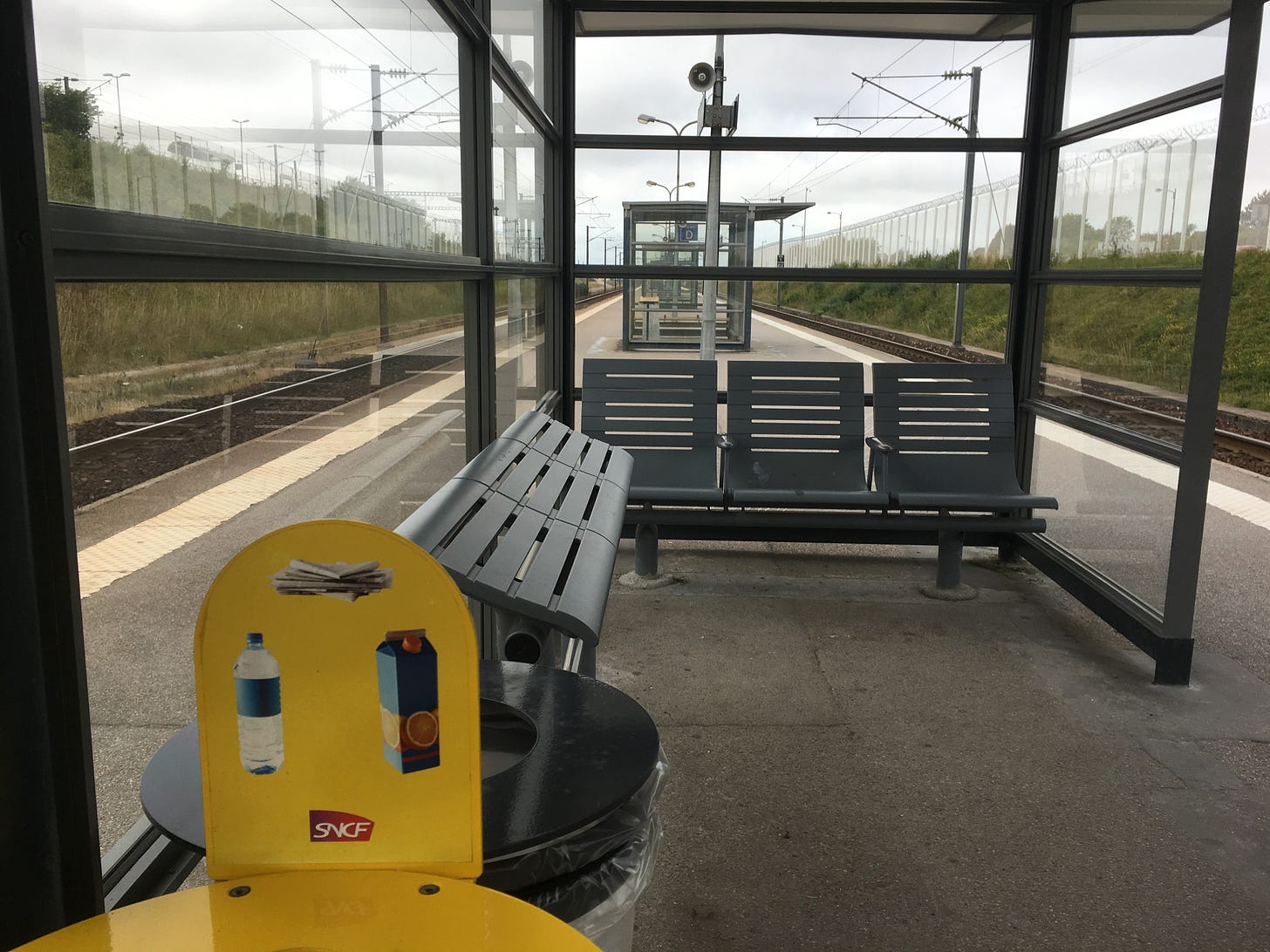
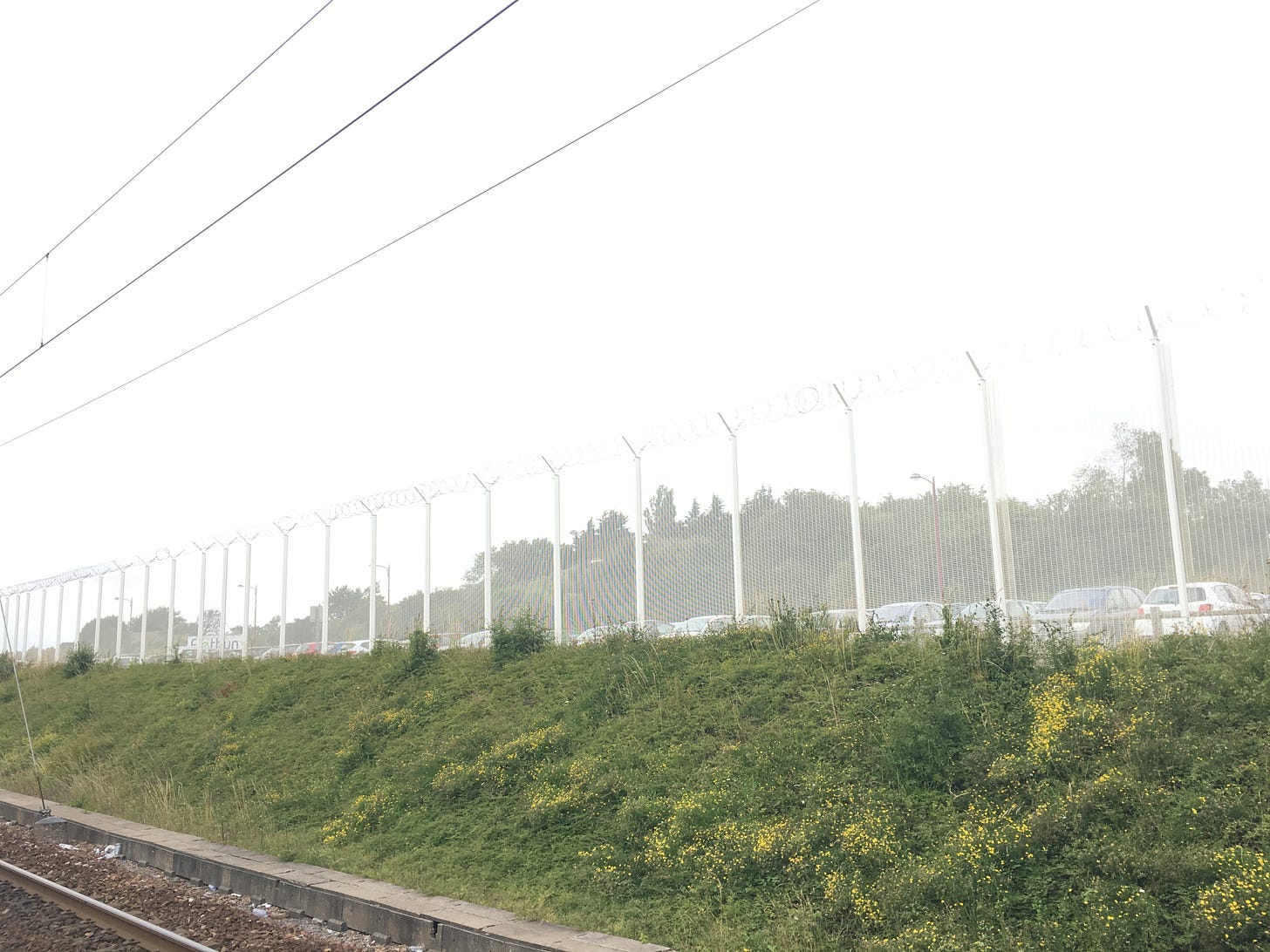
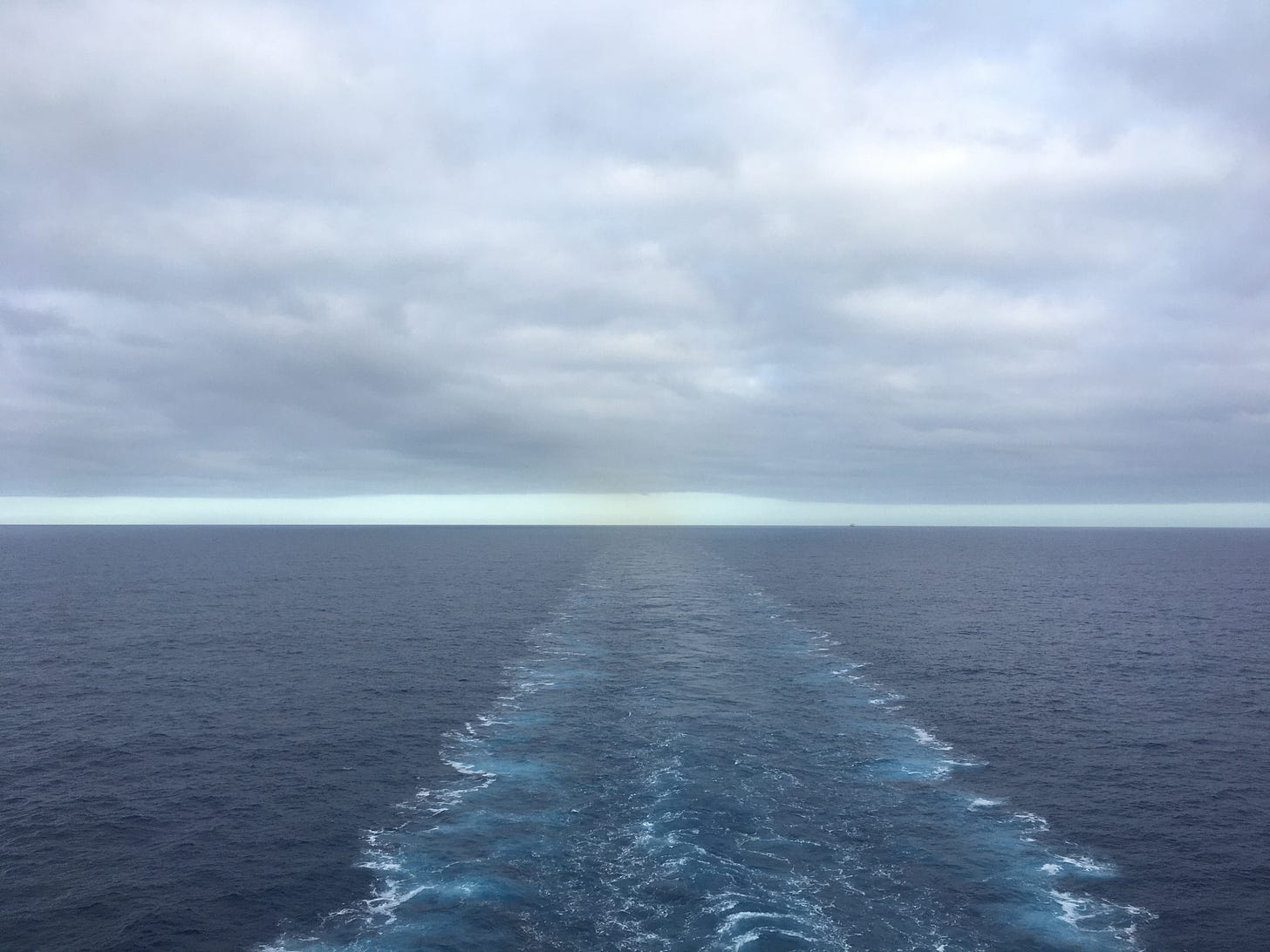
No desire to go to Calais and Calais has no desire to have us it seems.
Fascinating.